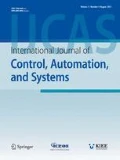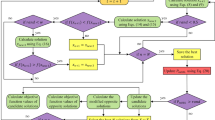Abstract
This paper presents the fuzzy PID filter (FPIDF) controller for the automatic voltage regulator (AVR). This controller is used to maintain the generating unit output voltage within allowable limit, and improve the weakness of the conventional controller’s fast response under any sudden changes in operating conditions or any disturbance that affect the voltage stability. Firstly, the PID low pass filter (PIDF) controller initial values are calculated by using teaching-learning based optimization (TLBO) algorithms. After that, we construct the FPIDF for self-tuning the PIDF parameters in real-time to make the controller fast response. The dynamic performance characteristic of the terminal voltage is investigated and analyzed when the system subjected to the different step change in reference voltage from low to high. The performance of FPIDF is compared with PIDF, fuzzy PID (FPID), and classical PID controller. Also, the FPIDF controller performance is compared with other metaheuristics algorithms based on the controller in the latest literature. Moreover, the strengths, robustness, and effectiveness of the FPIDF controller are checked under uncertainties of AVR parameters. The maximum total deviation of the system performance is calculated in different ranges of the system parameter deviations. The results show a small maximum total deviation percentage when using the proposed controller. Finally, we can observe that the FPIDF controller has better dynamic performance than the other controllers, also has strong robustness and fast real-time response under any sudden changes in system operation.
Similar content being viewed by others
References
P. Kundur, Power System Stability and Control, Tata Mc-Graw Hill, New York, 1994.
W. Deng, J. Xu, and H. Zhao, “An improved ant colony optimization algorithm based on hybrid strategies for scheduling problem,” IEEE Access, vol. 7, pp. 20281–20292, February 2019.
W. Deng, H. Zhao, L. Zou, G. Li, X. Yang, and D. Wu, “A novel collaborative optimization algorithm in solving complex optimization problems,” Soft Computing, vol. 21, no. 15, pp. 4387–4398, February 2016.
W. Deng, H. Zhao, X. Yang, J. Xiong, M. Sun, and B. Li, “Study on an improved adaptive PSO algorithm for solving multi-objective gate assignment,” Applied Soft Computing, vol. 59, pp. 288–302, October 2017.
M. Willjuice and S. Baskar, “Covariance matrix adaptation evolution strategy based design of centralized PID controller,” Expert Systems with Applications, vol. 37, no. 8, pp. 5775–5781, August 2010.
S. Z. Zhao, M. Willjuice, S. Baskar, and P. N. Suganthan, “Multi-objective robust PID controller tuning using two lbests multi-objective particle swarm optimization,” Information Sciences, vol. 181, no. 16, pp. 3323–3335, August 2011.
R. R. Sumar, A. A. R. Coelho, and L. D. S. Coelho, “Computational intelligence approach to PID controller design using the universal model,” Information Sciences, vol. 180, no. 20, pp. 3980–3991, October 2010.
L. D. Coelho and D. L. A. Bernert, “PID control design for chaotic synchronization using a tribes optimization approach,” Chaos, Solitons and Fractals, vol. 42, no. 1, pp. 634–640, October 2009.
S. P. Singh, T. V. P. Singh, and M. G. Babu, “Analytic hierarchy process based automatic generation control of multi-area interconnected power system using Jaya algorithm,” Engineering Applications of Artificial Intelligence, vol. 60, pp. 35–44, April 2017.
L. D. Coelho, “Tuning of PID controller for an automatic regulator voltage system using chaotic optimization approach,” Chaos, Solitons and Fractals, vol. 39, no. 4, pp. 1504–1514, February 2009.
N. S. Rathore, D. P. S. Chauhan, and V. P. Singh, “Luus-Jaakola optimization procedure for PID controller tuning in reverse osmosis system,” International Journal of Electrical, Electronics and Data Communication, vol. 3, no. 6, pp. 2320–2084, June 2015.
S. Wadhwani and V. Verma, “Evolutionary computation techniques based optimal PID controller tuning,” Proc. of the International Journal of Engineering Trends and Technology, vol. 4, no. 6, pp. 2529–2534, June 2013.
N. S. Rathore, N. Kundariya, and A. Narain, “PID controller tuning in reverse osmosis system based on particle swarm optimization,” International Journal of Scientific and Research Publications, vol. 3, no. 6, pp. 1–5, June 2013.
R. Wanga, H. Jing, C. Hu, M. Chadli, and F. J. Yan, “Robust H∞ output-feedback yaw control for in-wheel motor driven electric vehicles with differential steering,” Neurocomputing, vol. 173, PP. 676–684, January 2016.
A. El Hajjaji, M. Chadli, M. Oudghiri, and O. Pages, “Observer-based robust fuzzy control for vehicle lateral dynamics,” Proc. of the American Control Conference, Minneapolis, June 2006.
A. Akhenak, M. Chadli, D. Maquin, and J. Ragot, “State estimation via multiple observer with unknown inputs: Application to the three tank system,” Proceeding the 5th IFAC Symposium on Fault Detection, Supervision and Safety for Technical Processes, June 2003.
J. I. Chowdhury, D. Thornhill, P. Soulatiantork, Y. Hu, N. Balta-Ozkan, L. Varga, and B. K. Nguyen, “Control of supercritical organic rankine cycle based Waste heat recovery system using conventional and fuzzy self-tuned PID controllers,” Int. J. Control Autom, Syst, vol. 17, pp. 1–13, Augest 2019.
K. Eltag, M. S. Aslam, and Z. Chen, “Functional observer-based T-S fuzzy systems for quadratic stability of power system synchronous generator,” Int. J. Fuzzy Syst, vol. 22, pp. 172–180, February 2020.
W. Shao, Z. Q. Meng, H. A. Zhou, and K. Zhanga, “A photovoltaic array simulator based on current feedback fuzzy PID control,” Journal of Intelligent & Fuzzy Systems, 29, pp. 2555–2564, November 2015.
K. Eltag, M. S. Aslamx, and R. Ullah, “Dynamic stability enhancement using fuzzy PID control technology for power system,” Int. J. Control Autom, Syst, vol. 17, no. 1, pp. 234–242, January 2019.
P. Ochoa, O. Castillo, and J. Soria, “Optimization of fuzzy controller design using a differential evolution algorithm with dynamic parameter adaptation based on type-1 and interval type-2 fuzzy systems,” Soft Comput, vol. 24, no. 1, pp. 193–214, August 2020.
O. Castillo, F. Valdez, J. Soria, L. Amador-Angulo, P. Ochoa, and C. Peraza, “Comparative study in fuzzy controller optimization using bee colony, differential evolution, and harmony search algorithms,” Algorithms, vol. 12, no. 1, pp. 1–21, December 2018.
P. Melin, E. Ontiveros-Robles, C. I. Gonzalez, J. R. Castro, and O. Castillo, “An approach for parameterized shadowed type2 fuzzy membership functions applied in control applications,” Soft Comput, vol. 23, no. 11, pp. 3887–3901, September 2019.
R. V. Rao, D. P. Rai, and J. Balic, “Multiobjective optimization of machining and micro-machining processes using non-dominated sorting teaching-learning-based optimization algorithm,” J Intell Manuf, vol. 29, no. 8, pp. 1715–1737, March 2016.
V. Patel and V. Savsani, “Multi-objective optimization of a Stirling heat engine using TS-TLBO (tutorial training and self learning inspired teaching-learning based optimization) algorithm,” Energy, vol. 95, pp. 528–541, January 2016.
J. Q. Li, Q. K. Pan, and K. A. Mao, “Discrete teaching-learning-based optimisation algorithm for realistic flow-shop rescheduling problems,” Eng Appl Artif Intel, vol. 37, pp. 279–292, January 2015.
J. N. Shen, L. Wang, and H. Zheng, “A modified teaching-learning-based optimisation algorithm for bi-objective reentrant hybrid flowshop scheduling,” Proc. of the International Journal of Production Research, vol. 54, no. 12, pp. 1–18, December 2015.
P. M. Anderson and A. A. Fouad, Power System Control and Stability, IEEE Press, Piscataway, NJ, 1993.
S. Chatterjee and V. Mukherjee, “PID controller for automatic voltage regulator using teaching-learning based optimization technique,” Electrical Power and Energy Systems, vol. 77, pp. 418–429, May 2016.
Z. L. Gaing, “A particle swarm optimization approach for optimum design of PID controller in AVR system,” IEEE Trans Energy Convers, vol. 19, no. 2, pp. 384–391, April, 2004.
Y. Tang, M. Cui, C. Hua, L. Li, and Y. Yang, “Optimum design of fractional order PID controller for AVR system using chaotic ant swarm,” Exp Syst Appl, vol. 39, no 8, pp. 6887–6896, June 2012.
I. Pan and S. Das, “Frequency domain design of fractional order PID controller for AVR system using chaotic multi-objective optimization,” Int J Electr Power Energy Syst, vol. 51, no. 10, pp. 106–118, October 2013.
K. J. Astrom and T. Hagglund, PID Controllers: Theory, Design and Tuning, Instrument Society of America, USA, 1995.
B. Youn and D. Sun, “Fuzzy PID control technology for synchronous generator excitation,” International Journal of Control and Automation, vol. 8, no. 10, pp. 91–98, January 2015.
M. N. Anwar and S. Pan, “A frequency domain design of PID controller for an AVR system,” J Zhejiang Univ Sci, vol. 15, no. 4, pp. 293–299, April 2014.
D. H. Kim, “Hybrid GA-BF based intelligent PID controller tuning for AVR system,” Appl Soft Comput, vol. 11, no. 1, pp. 11–22, October 2009.
R. V. Rao and V. D. Kalyankar, “Parameters optimization of advanced machining processes using TLBO algorithm,” Proc. of the Conf. EPPM, Singapore, pp. 21–31, September 2011.
Author information
Authors and Affiliations
Corresponding author
Additional information
Publisher’s Note Springer Nature remains neutral with regard to jurisdictional claims in published maps and institutional affiliations.
Recommended by Associate Editor M. Chadli under the direction of Editor Young IL Lee.
Khaled Eltag received his B.Sc. degree in electrical and electronic engineering, Faculty of Engineering Sciences from Omdurman Islamic University (OIU), Khartoum, Sudan, in 2003, and an M.S. degree in electrical power engineering, Faculty of Engineering and Architecture from University of Khartoum, Khartoum, Sudan, in 2012. He is studying for his Ph.D. degree from 2016 in control science and engineering with the School of Automation, from Nanjing University of Science and Technology, P. R. China. He was a Lecturer at the Department of Electrical and Electronic Engineering from 2006 to 2016, Omdurman Islamic University (OIU), Khartoum, Sudan. His research interests include fuzzy system, non-linear system control, adaptive control, and electrical power system stability and control.
Baoyong Zhang received his B.Sc. and M.Sc. degrees from Qufu Normal University, Qufu, China, in 2003 and 2006, respectively, and a Ph.D. degree from the Nanjing University of Science and Technology (NJUST), Nanjing, China, in 2011. In 2008, he was a Research Associate with the Department of Mechanical Engineering, University of Hong Kong, Hong Kong, for three months. From 2008 to 2009, he was a Visiting Fellow with the School of Computing and Mathematics, University of Western Sydney, Penrith, NSW, Australia. From 2011 to 2012, he was a Post-Doctoral Fellow with the Department of Mechanical Engineering, University of Hong Kong. He joined the School of Automation, NJUST, as a Lecturer in 2010 and was selected as a Young Professor of NJUST in 2014. His current research interests include robust control and filtering, time-delay systems, stochastic systems, switched systems, nonlinear systems, LPV systems, and complex networks. Dr. Zhang is an Associate Editor of the Journal of the Franklin Institute, and a member of the IEEE CSS Conference Editorial Board.
Rights and permissions
About this article
Cite this article
Eltag, K., Zhang, B. Design Robust Self-tuning FPIDF Controller for AVR System. Int. J. Control Autom. Syst. 19, 910–920 (2021). https://doi.org/10.1007/s12555-019-1071-8
Received:
Revised:
Accepted:
Published:
Issue Date:
DOI: https://doi.org/10.1007/s12555-019-1071-8




